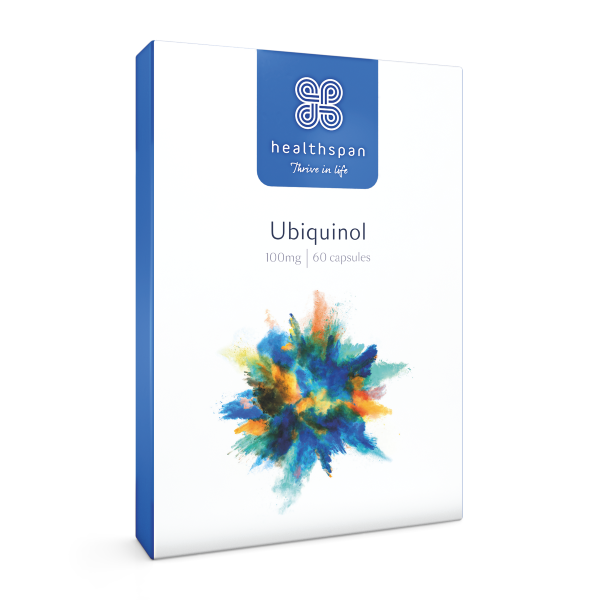Coenzyme Q10 (CoQ10) is a naturally occurring antioxidant that's present in virtually every cell of your body, with high concentrations in the heart. CoQ10 helps your cells create energy.
🕒 3 min read
Sometimes referred to as your body's 'spark plug', CoQ10's job is to help convert food into energy. It does this by firing up and nurturing the battery-like mitochondria – the powerhouse of each tiny cell – and boosting cell growth and maintenance.
As well as being key to energy production, CoQ10 also has anti-inflammatory properties: as an antioxidant, it fights the harmful oxidisation caused by exposure to environmental toxins, and which contributes to many of the diseases we usually associate with older age, including heart disease.
Do you need a CoQ10 supplement?
Although CoQ10 deficiency – which brings symptoms such as weakness, fatigue and even seizures – is rare, levels of CoQ10 activity in your body will decline naturally with age. That's because, along with the slowing down of so many other bodily functions and processes, your body's ability to make CoQ10 also decreases as you get older.
In fact, your CoQ10 production may have peaked in your 20s, which is why, in later years, you may find yourself thinking about supplementation. The question is: do you need to take a pill, or will your diet be enough?
It's true that a broad and healthy diet will help to replenish dwindling supplies. CoQ10 is found in a range of foods (including chicken, organ meats, oily fish, eggs, wholegrains and nuts) and converted in the body from an oxidised form of CoQ10 called ubiquinone to body-ready ubiquinol. But the amount you can get from food alone is not enough to significantly increase your CoQ10 levels.
What is ubiquinol?
Taken as a supplement, ubiquinol – the unoxidised version of CoQ10 – may, according to some research, be more easily absorbed than oxidised CoQ10 (ubiquinone). Even though your ubiquinone supplement will be converted to ubiquinol in your body, one 2018 study of older men found that CoQ10 activity in the body was more enhanced after just two weeks of supplementation with ubiquinol compared to taking ubiquinone over the same period.

Ubiquinol (CoQ10)
High-absorption form of coenzyme Q10 with vitamin B1 to support your heart health and energy metabolism
- 100mg ubiquinol, the most absorbable form of coenzyme Q10
- Coenzyme Q10 is needed for energy production in cells
- Vitamin B1 contributes to metabolism and nervous system function
The health benefits of CoQ10
As well as declining as a natural part of the ageing process, CoQ10 levels have been found to be lower than they should be in people with certain conditions, such as fibromyalgia, diabetes and heart failure.
Research into this popular and important substance is ongoing, with studies also looking at areas such as infertility, skin health, eye disease, and statin-induced muscle weakness, where it's been hypothesised that CoQ10 could make a positive difference.
Heart Failure
Patients with heart problems have been shown to have lower levels of CoQ10 within the heart muscle.
CoQ10 supplements have been found to reduce symptoms of heart failure (when the heart isn't pumping sufficiently strongly). Studies have shown that CoQ10 can strengthen the heartbeat and increase ejection fraction – the amount of blood pumped with each beat.
Other health benefits
Supplementation has also been found to improve symptoms of fibromyalgia, such as pain, fatigue and headache.
If you're someone who suffers with migraines, supplements seem to help prevent these debilitating attacks.
Research has also found that supplements may have an impact on hypertension (high blood pressure), reducing both systolic and diastolic blood pressure.
The best CoQ10 supplements
Healthspan's CoQ10 supplements are available in 60mg, 100mg and 200mg strengths. All three supplements have the benefit of added vitamin B1 (thiamine), which is proven to support heart health and further aid the conversion of food into energy.
Vitamin B1 is also present in Healthspan's 'body-ready' Ubiquinol supplements, along with vitamin E and, in Ubiquinol Max, vitamins E and C and omega 3 fish oils.
For optimal results we recommend taking your CoQ10 supplements with food.
CoQ10 safety
CoQ10 supplements are safe for adults to take, and produce few side effects when used as directed.
If you're taking drugs to control your blood pressure, be aware that CoQ10 may lower your blood pressure even further and possibly cause it to go too low.
As ever, if you're taking any prescribed medication or have any medical conditions, always consult your doctor or pharmacist before taking vitamins or supplements.







